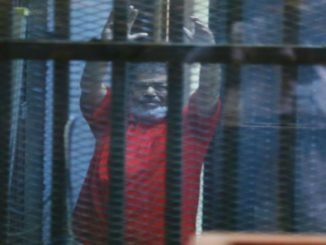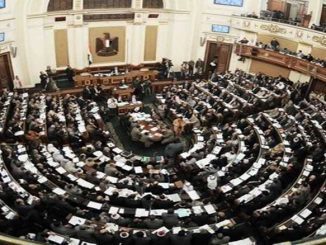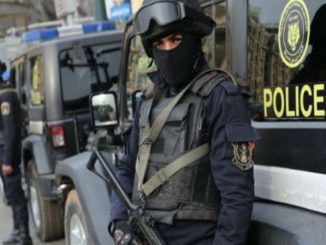
When Egyptian youth took to the streets for weeks in 2011 in Cairo’s Tahrir Square, there were hopes of freedom and democracy
Egypt’s rule is the worst under al-Sisi regime said the Financial Times in an article titled “Sisi’s Egypt: The march of the security state.”
FT said that Egypt’s “social and economic problems are deeper than ever under the former general’s regime.”
When Egyptian youth took to the streets for weeks in 2011 in Cairo’s Tahrir Square, there were hopes of freedom and democracy.
However, these hopes have faded away after the military coup in 2013 led by Abdel Fattah al-Sisi against Egypt’s first democratically elected President Mohamed Morsi.
The Financial Times said that, “But nearly six years after the revolution that captured the global imagination and raised hopes of a democratic transformation in the Middle East, the Arab world’s most populous nation is back in the grip of an authoritarian state.”
Al-Sisi didn’t save Egypt as he promised
As a result, they kept faith even “as repressive security agencies they had rebelled against returned to the fore and security was elevated as the organizing principle of the state, “said FM.
However, the security state returned stronger than before and Egypt’s problems piled up instead of being resolved.
The political space has narrowed and nearly vanished under al-Sisi’s rule. “Even political space that even under the Mubarak regime allowed some freedom of expression has been firmly shut, and prisons are teeming with detainees, “said FT.
Moreover, Egypt’s population,which is growing at a rate of 2.5%, 27 %of them live below the poverty line, up from 25 % before the Arab spring.
On the other hand, even al-Sisi’s Gulf supporters who backed him financially, have withdrawn from supporting his regime amid political differences.
On top of them is the relations with Saudi Arabia after Egypt voted in favor of the Russian resolution the UN.
Mockery and criticism to his leadership has spread on the social media nearly in every occasion or speech to the nation .
Success is hard to be achieved by al-Sisi
Despite al-Sisi’s economic reform in the light of the IMF loan, success seems hard to be achieved.
Egypt has implemented the boldest reforms since the 1980s to secure the IMF loan to restore public finances and encourage foreign investors.
It imposed a value-added tax, capped public sector salary increases, cut off fuel subsidies and — most dramatic of all — allowed the Egyptian pound to float so that its value halved against the dollar. “
However, the immediate impact of the measures was a spike in annual inflation, which reached almost 20 % in November, and is expected to remain in double digits well into next year.”
The military makes the situation worse
Beyond fiscal and monetary stabilization, the FT believes that one of the major problems in al-Sisi regime is that even the structural and financial reforms will “clash with a military mindset that is deeply suspicious of the business community, associating it with the corruption and cronyism of the Mubarak era that fueled popular resentment.”
One businessman said that the economy cannot be propelled forward without the private sector — first you have to come to this conclusion and they [the regime] have not yet,”. Until then, he adds, “a lot of the private sector is staying on the fence”.In fact, Al-Sisi has expanded the role of the military as it manages national projects that he always described “as morale boosters, such as the expansion of the Suez Canal and the building of a new capital city — neither of which the business community finds necessary.,” said FT.
The army, which has long owned some businesses, has expanded its economic empire under al-Sisi rule with a new law allowing it to partner local and foreign companies. “New military-owned factories have sprung up over the past two years, including in the cement and steel sectors, “wrote the FT.
FT cited people familiar with the workings of the regime say a “shadow” cabinet made up of security agencies in effect operates alongside the civilian government and weighs economic decisions according to the risks of popular unrest.
However, al-Sisi always deny these claims as he said in an interview with the FT as he declined suggestion that the army could be looking to profit from business. He said, “The Egyptian military is sparing no effort to help the country. It is so dangerous to accuse it of such things.”
He contends that military economy accounts for 1.5 per cent to 2 % of gross domestic product.
He also said that “military businesses are designed to ensure self-sufficiency for its personnel and relieve burdens on the market, not to compete with the private sector.”
Authoritarianism has become far more entrenched under al-Sisi
Financial Times considered the military’s economic interventions as” one manifestation of the broader return of the security state that many Egyptians had thought was gone after the 2011 revolution.”
It said that “authoritarianism has become far more entrenched under Mr Sisi. “
Al-Sisi regime launched massive crackdown on political opposition especially from the Muslim Brotherhood and their supporters, but western officials and some Egyptian politicians “warn that attempts to eradicate it have also radicalized younger members and created new recruits for terrorist groups.”
Furthermore, human rights organizations have come under pressure and civil society leaders slapped with travel bans.
Parliament recently approved a law to tighten its grip over the civil society. The text of the law was even harsher than the one proposed by the government.
“The problem, he adds, is that the regime measures the success of its policies by whether people take to the streets.”
“The measure of success is also how many people fall back into poverty, what happens to business confidence, whether the economy grows,” he says.
In fact, al-Sisi said in his interview with FT that his popularity has gone down but says he is not running in a “popularity contest”.
He also rejects that his rule is worse than that of Mubarak, he claims he is “building love between Egyptians, a wave of respect for the other that will start in Cairo and spread across the region”.
Al-Sisi says also that the presidency of Egypt is a burden. Yet it is one that many expect him to try and keep when his term ends in 2018. He will not reveal whether he will seek a second term.
Last August, the Economist has highlighted al-Sisi as the one who is responsible for the ruining of Egypt in its editorial titled: The Ruining of Egypt…Repression and the incompetence of al-Sisi are stoking the second uprising.”
The magazine said at the end of its editorial that the demographic, economic and social pressures in Egypt are relentlessly increasing and that al-Sisi is incapable of providing the sustainable stability to Egypt, the political regime also needs to be reopened.



